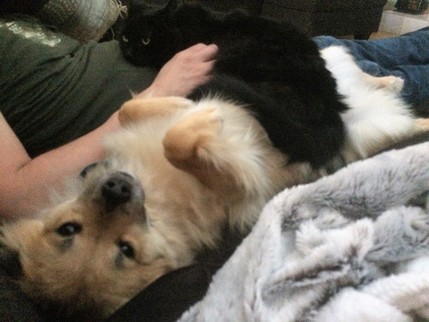|
When motivation is required to keep going... Motivation - the desire for someone to do something. Incentive, inspiration, enthusiasm. For Kevin, motivation is easy. Wait by the food dish in the kitchen until someone trips over him and remembers to feed him his kibbles. His cat toy provides him with the motivation to play thus staying active. The motivation for humans to work is also easy as most of us work for the basics needs; food, clothing, and shelter. If you already have acquired the basic needs, then comparing yourself to the neighbours can motivate you to achieve or do more. This is a less desirable motivation as it leaves you always wanting more and not accepting and experiencing contentment.
Job satisfaction can be good for some lengths of time and then, not so good for other periods of time. It is important for management to recognize these ups and downs. When the team contentment levels are good, then management does their best to keep it that way. However, full team contentment can't always be accomplished as people have external factors that can influence their work - relationships, kids, economy, health, etc.. For a project team, there needs to be something that everyone is working towards as a group. If individuals are working on various projects, then a common team goal. There are smaller daily or weekly baby goals that can be discussed and decided by team members which are more individual. These are not the same goals that management uses to review performance. Baby goals are set by the individual and achieved with assistance when required by the project manager specific to their day-to-day roles. Not everyone wants to set goals for themselves. Pushing individuals that do not want to be pushed can create negative experiences for all. You can't take motivation and try to stuff it into the souls of everyone. You can, but you are usually an unbalanced individual or a sociopath. To hear an "inspiring" speech from the company CEO doesn't ignite motivation either. After years of the office rallies and town hall presentations, we have all become immune to the lyrical words of upper management describing the company profit goals and direction. Negative Nellies are also motivation killers. These are the managers who can only find fault and criticise the team and demoralizes everyone's attempt at work satisfaction. When individuals are addicted to managers that they can never please, the motivation to excel is replaced by abuse. This should be addressed by upper management and made apparent to the team that action has been taken to remove the abuse. Kevin is acting bored as Spring is coming and the birds are starting to chirp at him through the window. However, it is still cold and he doesn't want to go outside. His old cat toy doesn't get him off the chair and doing lunges as it once did. He starts to knock objects of the computer desk as his way of telling me he isn't motivated by his toy anymore.. It is now time for a new cat toy to give him motivation.
0 Comments
Animal references to office behaviours. Kevin and I are approaching our sixth month of The Corporate Litterbox. This is a good time to refresh overall objective of our work. As mentioned many ramblings ago, there are lots of great tools and resources available on how to be a good, efficient, and profitable Project Manager. There are lists, spreadsheets, how-to's, however, there are some individuals looking for a more human or personable description of management. Management is obviously about people. People relate to stories and animals. Thus, Kevin the Cat and the Corporate Litterbox. Kevin had work habits that I could share, and so does Mikey the dog. This observation presented questions about our society. Is it a Doggy-dog world or a Dog-Eat-Dog? Or is it full of Cat Fights and Fur Flying? Which leads to the bigger question:
Do women behave like cats and men behave like dogs? This is a very controversial and highly generalized question which doesn't have a lot of scientific data to answer it at this time. The overall characteristics from a site www.sciencedirect.ca, observed dogs are "playful, chase-prone, curious, fearless, sociable, and aggressive". Another site www.phychologytoday.com indicated that cat people are more distinctive that dog people, as cats are considered "graceful, subtle, independent, and thoughtful". These umbrella traits to describe dogs and cats are oddly reflective of words used to describe male and female friends and coworkers. Although, cats are more likely to eat each other under extreme environmental conditions then dogs, cats are trusting with only those they are familiar. Cats are solitary hunters and self-sufficient. Dogs are pack hunters. Cats have stealth and agility. Dogs are bigger and have larger muscles. Cats are more likely to potty train themselves. Dogs need to be trained. Cats have good memory. Dogs, not so much. Still seeing a male and female trend. The similarities seem strong, but these general personality qualities are not enough evidence to establish a good argument that women behave like cats and men like dogs. It is more logical that each individual has a preference for the traits of each species, irrelevant of sex. Good leaders observe their team for different traits and behaviour patterns and try to use them to the advantage of the project. Individuals who work slow and steady should be put on projects which require that talent. Perhaps with an impatient intern who needs to learn quality and restraint. The quick-thinker and aggressive personality - to help push and get work. If an individual wants to try and change their perceived traits, let them. They may not succeed at first, they may never want the opportunity again, or they just might excel. People like to feel individualized and not always generalized, even when playing on a team. Kevin sometimes acts like a dog. He actually likes them, and he is interested in playing with them. I am good with him having days where he acts like a dog and days which he is very "cat". He is just who he is. Author's Note: Apologies if reptiles, rodents, and non-vertebrate are not represented in these posts. No discrimination is intended. It is more difficult for the fish to hold a pen and the reptiles keep eating the keyboard. We are working to find other options where their thoughts on Project Management can be included in our posts. Project Management and keeping the client or boss happy. When Kevin goes to the Vet, the office technician greets him by name. The staff instantly start cooing about his fur and with soft voices and gentle petting, coax him out of his carrier.
The Vet who inspects him is an old farm doctor who has a natural ease around animals and gives his full attention to reviewing Kevin's chart and asking inquisitive questions about how his patient is doing. Maybe what the Vet has is good "bed-side manner", but it is also customer service. Including the herding of cats, Project Management is sales and customer service. Before my foray into the world of architecture, I worked in customer service for a large retailer. I still use the information that I learned from all-day How to Sell seminars and service workshops to deal with clients, consultants, and contractors. After a frustrating day of customer service I wrote the following which was used by a prestigious department store in London: The Customer is Always Wrong?! The customer is always right. Well, at least that is what everyone is told when they start their first job in any service industry. Of course, every manager utters, "at least let them believe they are right. Even if they are being complete idiots." For those who have not had the pleasurable experience of working with customers, it is one hell of an adventure. Movie stars that walk the great red carpet to receive an Oscar have worked hard at the art of acting. And so have most in customer service. As the customer stands before you listing profanities or not understanding what you are trying to say, you continue to smile and wait patiently for the right time to help them understand. You can't argue, roll your eyes, scream at the ignorant, or lash out with spiteful words. However, you can draw grotesque pictures of evil customers at your desk and imitate the ignorant to your co-workers. Politically correct or not, it is good to talk about or mimic traumatic customer service events. The customer is always right slogan can border on ethics. Sometimes you do have to lie on behalf of your company to please the customer. "Of course it is our fault that your product does not work properly...We most certainly do have a sabotage team to ensure the failure of your product....With the ridiculous high prices we charge, we have to validate our net income by hiring useless employees to do menial tasks." Customers and good customer service it what makes business. Our world economy would not exist without them. However, sometimes a smile when you want to rip-in-half the employee who is trying to help you and shove their business right up their @$$, can make such a difference for everyone. If the customer really was always right, wouldn't the business world be perfect?! I don't think Kevin's Vet worked in customer service for a retailer or as a car salesman. Most university programs for degrees in professions where project management is used most do not have courses that include proper sales and customer service training. Kevin gets back into his crate a bit cranky as he was given a shot in the butt. He didn't get a lollipop, but got a cat treat. I am definitely satisfied with his visit and we will return to give his vet more work. Learning computer software for the project. As a cat, Kevin does not learn new tricks well. If he does choose to acquire a new talent, then he is really bored because it is too cold to go outside or he has been motivated by kitty treats.
Depending on your industry, software and programs can be required to update monthly or yearly. With this intense schedule for latest version release, you need to know what the software and programs are being used for to properly lead a project group. It is advantageous to understand the roles or the individuals on the team and what software and programs they need to use to work effectively and efficiently. Knowing what aspect of the project each person is responsible for allows you to accurately determine the billable time required to complete tasks. This does not mean you need to sacrifice time and money to learn the software and program(s) as a high-end user, but time spent enriching your understanding will make you better at organizing the project execution. Think of it as your own episode of Undercover Boss. Project Managers should be patient with a team that has a stupid deliverable and who have recently learned a program. Assessing the software and programs can reveal what could be slowing the project down or creating stress for the users. How the software and programs are used if the team is derived from individuals from all over the world is crucial. There isn't time for experimental computer connections or software compatibility. This research needs to be done at the time of Overall Project Plan genesis or factored into the project schedule. The complexity of projects increase daily and so do the complexities of software and programs required for deliverables. There can be four or five programs you use daily, to complete your work. There can also be a disconnect between upper management and the team executing the project work with not knowing the strain that software and programs can place on the project deliverable. An optimal team would have individuals cross-trained in several tasks with having a specialty in one element, like having a major and minor. The rise of the generalists. Mandatory training seminars can ensure attendance by the necessary parties, but the training seminar durations need to be realistic. It is hard for management and team members to find time with their regular daily duties. All-day seminars and then no direct implementation wastes the companies time and money. It has been several weeks, but Kevin is sitting up for his treats. There are times he stares at me with disgust, but I know he wants a reward. Now if I could teach him to clean his litterbox... |
Author(s)Fiona Warren - 17 years experience with large high-profile projects and teams. Archives
April 2018
Categories |









 RSS Feed
RSS Feed